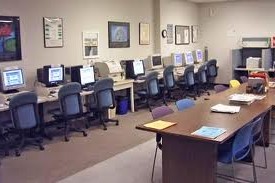The modern age is the age of computers. Computers provide a wide range of education and executive softwares. These are widely used in satellites, spacecrafts, aircrafts, airline offices, leading banks, processing of data, booking of seats, making reservations in large organizations, in military establishments and many other Corporations. With the introduction of computers, development in India seems to be gaining rapid momentum. As we march towards the 21st century, we must accept the inevitability of a computer revolution in the near future. It is an inseparable part of development, as demonstrated by other countries. This new development has affected different people in different ways. Some people are thrilled at the prospects of saving their precious time and labour and doing things at the speed of electricity. The others feel depressed because of inherent danger of serious unemployment problem in India, which computers may bring in. Some people feel happy and cheerful as the jobs in computers are considered sophisticated. According to them, computers offer not only the opportunity to work on feather touch machines in an air-conditioned office; they also offer a lot of creativity and the scope for innovation. But most of the people in our country are indifferent to the whole affair. As far as I am concerned, I feel thrilled at the computer revolution. The computerization has given sizeable benefits to us making our lives more “livableâ€, and will be a virtual necessity for our survival in the long run. Nevertheless, I am depressed for the following reasons at the magnitude of problems that are arising because of large scale computerization.
One perceived threat is that computers create unemployment. Unfortunately, there is not adequate data to prove or refute this point and any attempt to put it together would be extremely difficult. However, a study conducted by the Cambridge University indicated that in UK there was a positive impact of computers on unemployment for the first 14 years of computerization, and thereafter the reverse took place. Similar study in India also revealed positive effects on employment. The crux of the matter is that the choice of computer application alone would determine the impact on employment. If we maintain a discipline of not computerizing those man power intensive applications which can be efficiently carried out manually, and concentrate on computerizing only those applications that help in optimizing resource utilization, the impact would be positive for employment as well as the economy.
The over dependence on computers is bound to dampen the brain power of human beings by non-use, resulting in the decline of the average standard of intelligence because of idleness. The non-use of human brain will rust and gradually erode our thinking power. This will adversely affect the intelligence of our future generations in the third world countries. Consequently, the may again be enslaved.
In India, we cannot ignore the reality that 70 percent of the working population is agricultural and 30 percent of the population is living below the poverty line and demands top priority for basic needs as against computerization; 60 percent of the eligible population is unemployed, only 0.04 % of the population, ( working in corporate Offices) will be effected. The massive investment in this technology will deprive crores of Indians, living below poverty line, the basic necessities of life, which the Govt. could have provided them otherwise.
Â

